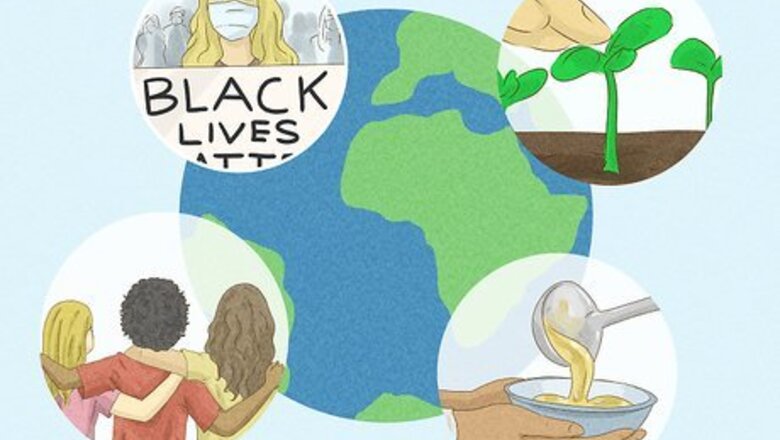
views
Avoid acting judgmental.

If you want to change the world, make sure you’re open to change and different perspectives. When you judge other people, you can sometimes shift blame off of yourself and may not be tackling the real issues. Try to view life from the other person’s point of view so you get a better understanding of where they’re coming from. As long as you stay open-minded, you’ll be able to make a lot more changes for the better. Look for choices that you feel good about making so you’re less judgemental of others. For example, if you feel good about how you look, you shouldn’t judge other people for how they look. Rather than bringing someone down, look for something nice to say about them instead to help reframe your thoughts.
Be genuine and authentic with people.

You’ve probably heard that honesty is the best policy and that holds if you’re looking to improve yourself and the world. Don’t do things to make people like you or to boost your ego, but do them because you’re actually interested in them. When people see you’re authentic with them, they’ll trust you more and show you the same level of respect. Show generosity by helping other people out and acting like a team player.
Smile more.

Even flashing a quick smile can brighten someone else’s day. No matter where you are or who you meet, give them a warm smile when you’re around them. When you smile, you make the other person feel good and encourage them to smile too. If that person does the same, then you’ve set off a chain reaction of kindness! You don’t have to know the person to spread kindness! Try smiling at strangers as you walk past them. Make sure the smiling fits the situation. For example, you don’t want to smile when someone’s giving you bad news.
Give someone a compliment.

You’ve probably felt a warm and fuzzy feeling when someone says something nice about you, so why not return the favor? Say something that shows your appreciation for how they handle themselves emotionally or treat other people. Make sure you act sincere when you give your compliment so you come across as genuine. Even a few small words can have a huge impact on them. For example, you can say something like, “I really appreciate how patient you are when you’re listening to someone speak,” or “It means a lot to me that you took time out of your day to clean up the house when I was tired. Thank you.”
Celebrate another person’s successes.

It can be really easy to get jealous of other people when they succeed, but it’s a lot more rewarding to share their excitement. Avoid comparing yourself to other people and thinking of ways you can one-up them. Instead, really look at what they accomplished and appreciate the work they’ve done. As you uplift the other person, you may influence them to do the same in the future. Avoid taking credit for other peoples’ accomplishments.
Do random acts of kindness.

Even though being kind to someone doesn’t seem like you’re making a big change, your kindness will continue to spread through them. Genuine kindness involves acting friendly, caring, and considerate no matter the circumstances. Stay aware of the people around you and look for opportunities where you’re able to help them. For example, if you see someone struggling to carry groceries, you can offer to help them to their vehicle. Remember to treat yourself kindly as well so you take good care of your mental health. Use positive affirmations and avoid being too hard on yourself.
Use less water.

We can waste a lot of water when we’re bathing or cleaning, and it has a negative effect on the environment. Some simple things you can try at home are shortening the lengths of your showers, turning off the water when you’re brushing your teeth, and waiting until you have full loads of laundry before running your washer. Fix leaky pipes as soon as you can so you don’t waste any water. Check with your utility provider so you can see how much water you’re using so you can start cutting back. If you have landscaping outside, choose plants that naturally grow in your area since they’ll usually thrive better without additional watering. Not only will you help save freshwater, you’ll save some money on your water bill as well!
Recycle when you can.
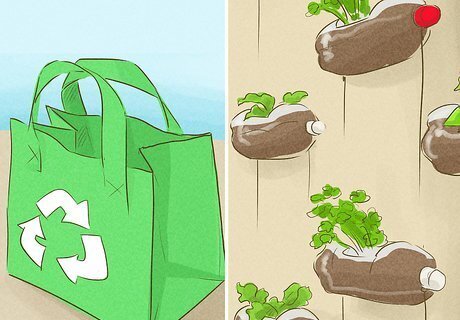
You’ve probably heard to “reduce, reuse, and recycle” throughout your life, but you may not have known how much it does to conserve natural resources. Whenever you’re about to throw something away, first check if it’s labeled as recyclable. Some examples of things you can recycle include plastic containers, paper, metal, glass, and electronics. Separate your recyclables from your regular trash and keep them in a different collection bin. Check with your area’s waste management services to see if recyclables are collected curbside or if you need to take them to a collection center. Some recyclable materials are different than others and need to be separated even further. Always check which recyclables your waste collection service accepts before putting them in the bin.
Buy eco-friendly and ethical products.

A lot of manufacturing relies on fossil fuels, chemicals, or unfair labor, so always research the companies you support and products you buy. As you’re shopping for products, check the packaging for words like “energy-efficient,” “recycled material,” or chemical-free” since they’ll have less of an impact on the environment. If you’re buying groceries, visit a farmers’ market to support local growers, shop in the organic section, and look for products that don’t contain any toxins. For example, you can switch from incandescent lightbulbs to more energy-efficient LED bulbs. When buying animal products, look up the company to see if the animals are treated well before buying. Try to support local businesses and products since they don’t have to travel as far, meaning it takes fewer emissions to deliver.
Reduce your carbon emissions.

When you burn fossil fuels, it adds pollution into the air that hurts the environment and leads to poor health. Even though it’s convenient to drive everywhere, look for some opportunities where you can use an alternative mode of transportation. If you don’t need to go very far and it’s a nice day, go for a walk or ride a bike instead. Otherwise, you can cut back on emissions by taking public transportation or carpooling with other people. Talk to your boss and see if working from home is an option for you. Even if you can work remotely a few days a week, you won’t have to burn any fuel during your commute. Electric vehicles also work well since they run on a battery rather than gasoline.
Raise awareness for causes you support.

Even if you don’t have a lot of time or money to put toward a cause, spreading information about it can help make other people aware of issues around the world. Write some social media posts explaining why the cause is important and why other people should pay attention to it. If you want to share your cause more privately, individually message your friends so you can tailor the message specifically to them. Use encouraging language that sounds hopeful rather than posting something that makes people feel guilty or frightened. You can even branch off of social media to post to personal websites or writing articles for a newspaper or magazine.
Look for volunteering opportunities.
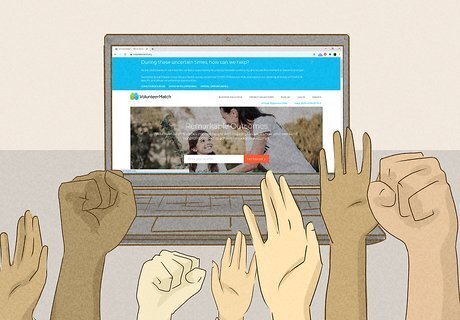
Volunteering is a great way to find people who care about the same causes you do and give back to your community. While there are so many opportunities out there, look for something that complements your skillset and how much time you have available. Search for chances to volunteer with local non-profits, religious organizations, or online. Once you find something that aligns with your interests, reach out to the organization to see how you can assist them the best. Check on websites like VolunteerMatch, Serve.gov, or Idealist for open opportunities near you. Each organization will have a different company culture, so even if your first volunteering opportunity doesn’t work out, keep searching for something that’s a better fit.
Support an animal shelter.

As shelters fill up, it gets more difficult to care for each animal’s welfare. If you’re a pet lover, your local animal shelter will appreciate any help and assistance you have to offer. Check the shelter’s website or contact them directly to find out what they need the most and how you can support them. They may just need money and supplies or they might ask you to volunteer your skills. Get as involved as you can so you can help the animals live happy and full lives. Consider adopting or fostering a new pet if you have the time and space to care for one. That way, you can find a new companion and make room for more animals at the shelter.
Find a clean-up program in your area.
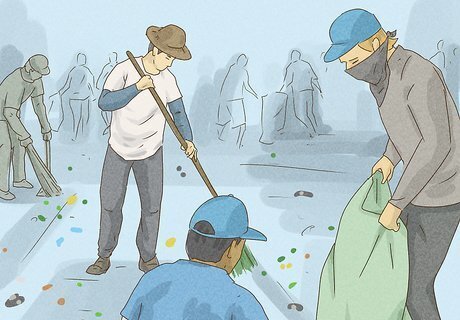
When people litter, the trash ends up in the environment and damages the natural wildlife. Even worse, some materials like plastic don’t break down naturally and continue polluting. Search online to see if there are clean-up initiatives in your city or state and register to volunteer. You may end up picking trash up from a beach, cleaning up around highways, or collecting waste from public parks. Even if you can’t find a clean-up program in your area, take a few seconds to pick up litter that you find so you can dispose of it correctly.
Donate to charity.
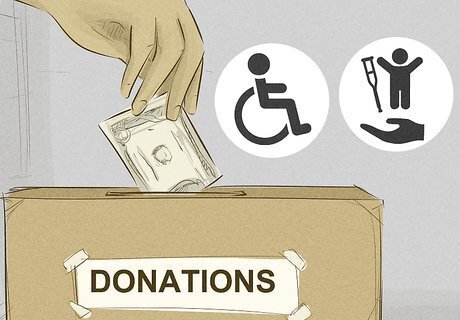
If you don’t have time to volunteer for the causes you support, even a small monetary donation can make a big difference. Search for charities that support issues that you care about and support and check if they have a donation page. Look for organizations that have transparency so you know exactly where your money is going. You can make a one-time donation or set up recurring payments. Always research charities before you give money to them to make sure your money is used responsibly.
Give blood.

In times of crisis, blood shortages could happen and make it difficult to treat patients. Look for a donation center or blood drive in your area and check the eligibility and health requirements you need. Usually, as long as you’re feeling well and staying healthy, you can give blood once every few months to help those in need. You may not be able to donate blood if you’re sick, have low iron, or if you’re taking certain medications. Even if you can’t donate, you can still make a monetary donation or volunteer at a blood drive.
Become an organ donor.

Many people need organ transplants in order to survive, but the waiting lists can be very long. While it can be hard to think about what happens after you pass away, signing up to be a donor can help save another person’s life. Many times, you can opt into being a donor at your local motor vehicle department, but it may vary depending on where you live. Look up how to register in your country or state online and complete the form. You may be able to donate organs like a kidney or part of your lung, pancreas, or liver while you’re still alive.
Vote for politicians that share your views.
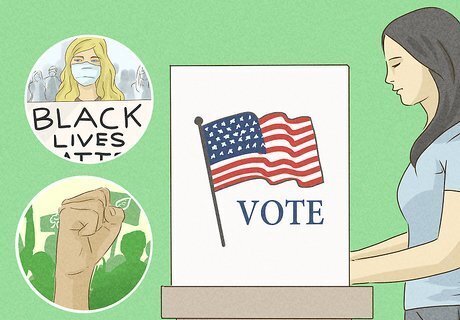
Starting on an individual level is great, but electing candidates that have the same values as you can help lead to changes on a larger level. Stay informed about the officials that are running in your local and national elections and research what they stand for and believe in. While no candidate will be absolutely perfect, look for the one that shares most of your views and be sure to vote for them in upcoming elections. If you really want to support the candidate, see how you can volunteer for their campaign and spread awareness about their policies.
Protest for what you believe in.

When you see injustices or want to take a stand for a cause you care about, you may need to peacefully protest to be heard. You’re completely free to express yourself and what you believe in, but you may need to find out your city’s permitting requirements beforehand. There are so many ways you can protest, such as marching, holding vigils, and performing a sit-in. No matter what cause you’re supporting, stay persistent and let your voice be heard. Never turn to violence while you’re protesting. Jane Goodall Jane Goodall, Conservation & Animal Welfare Advocate Make a difference by advocating for your beliefs. "Change happens by listening and then starting a dialogue with the people who are doing something you don't believe is right."












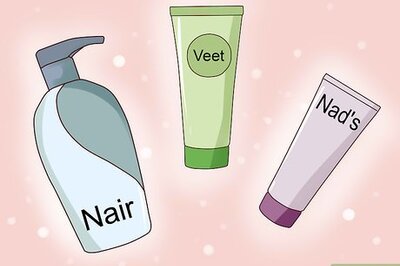





Comments
0 comment